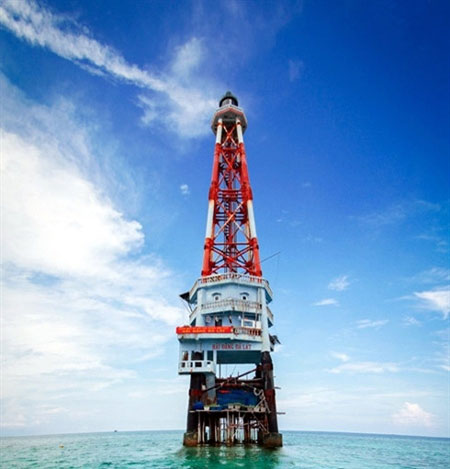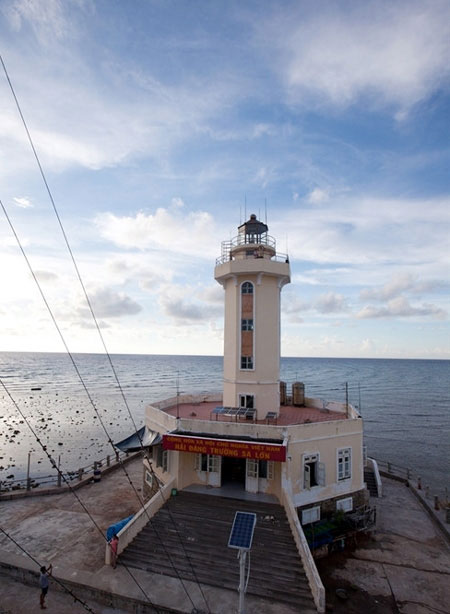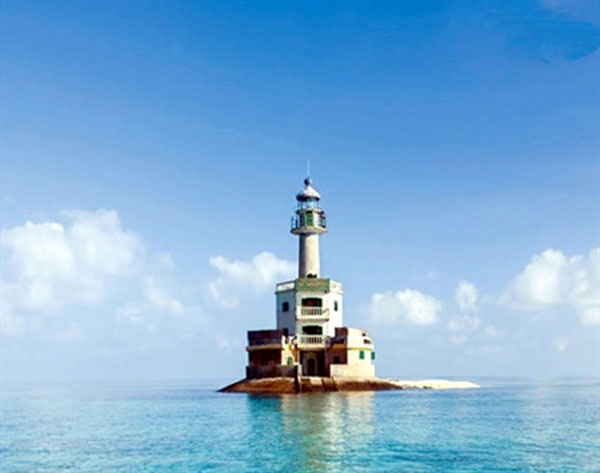VietNamNet Bridge – Lighthouses on Truong Sa (Spratly) archipelago guide ships at night and confirm Vietnam’s maritime sovereignty.
Located on Da Lat island, the Da Lat lighthouse was built in 1994 at a height of 42m.
To keep the lighthouses lit, lighthouse workers have to work all day and night in an extreme environment.
Truong Sa archipelago hosts nine lighthouses, three of which are located on Da Lat (Ladd Reef), Da Tay (West Reef), and Tien Nu islands.
Situated to the south of Truong Sa archipelago and built in 1994, Da Lat Reef’s lighthouse is 42 meters high and operated by four workers of the East Sea and Islands Maritime Safety Company.
Most of the station’s area is used for operating the lighthouse while a small space in the corridor is reserved for growing vegetables and raising chickens.
Vu Duy Tien, one of the four workers at the station, said there are four working shifts a night. When one person is on duty, the others will do other works like technical check and cleaning of the lighting system.
Tien said, “The island weather is very severe and the work is very hard. Of course, we lack many things but we love our job and the national sea and islands.”
Tien who has worked on Truong Sa archipelago for 20 years said the living conditions there have improved significantly. Every two months, supply boat Hai Dang 5 carries equipment and essentials for the staff.
The lighthouse on Truong Sa Lon Island is 25m high so ships, about 18 nautical miles away, can see the light. The lighthouse lamp is regularly maintained. (Photo: VNP)
Due to the harsh working conditions, lighthouse workers must have good health and professional skills. Whenever they fulfill their terms in one station, they will take a new mission in another.
Trinh Van Nguyen, head of Da Lat Lighthouse, said he had been working in all nine lighthouses on Truong Sa.
“My colleagues and I have safeguarded the lighthouses for 20 years. We have much experience in handling breakdowns. I can take vegetable farming as a very simple example. When the wind is so harsh or the waves hit the lighthouse, we will relocate the vegetable boxes further into the island. But we never think of leaving the posts,” Nguyen shared.
Staff members of Da Tay Lighthouse take responsibility of guiding vessels to identify their co-ordinates to get exact directions.
Tran Van Khanh, head of Da Tay Lighthouse, said with three members, they change a shift every two hours. The station has been equipped with a new maritime signal system.
He noted, "The work at the lighthouse is nonstop. The light must be kept turned on all the time. When there is a system breakdown, we only have minutes to fix it. If there are interruptions in maritime signals, it might be very dangerous for passing ships, losing direction or hitting hidden rocks or coral reefs."
The Da Tay Lighthouse is on Da Tay reef, built in June 1994, with a height of 20m.
After 20 years, Bui Van Son, Nam Yet Lighthouse’s chief, remains determined to work on Truong Sa archipelago. This is the second time he has worked in Nam Yet.
“I began to watch over the lighthouse in An Bang Island in 1995. At that time life was very difficult. Now we have electricity making the living condition better. We also have a TV and cold storage to keep food. More importantly, we have been provided with telephone helping us to communicate with our families. The mainland and island have become much closer to each other,” Son explained.












